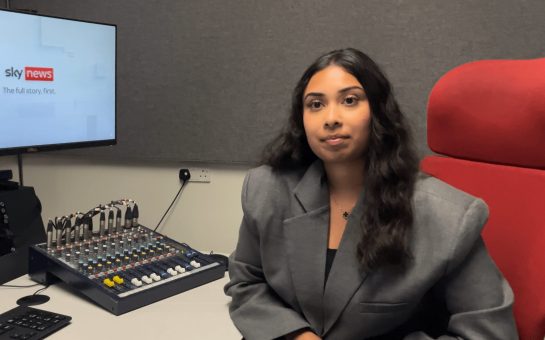By Naomi Curston
August 10 2020, 15.15
Follow @SW_Londoner
Watching more TV could be the key to language learning for the two-thirds of the UK population unable to speak anything but English.
Two British polyglots who between them speak more than 65 languages, agreed that popular culture was key to learning a language.
Alex Rawlings, 28, a journalist and documentary filmmaker from Ham, said: “Language learning shouldn’t be: ‘I’m learning French because I want to learn all the irregular verbs’, it should be ‘I’m learning French because I want to understand this amazing detective series better and if I don’t speak French I’m going to miss out on it’.
“That’s essentially how English is learnt in other countries – it’s very deeply embedded in popular culture, so people take it for granted that they’re going to learn English.”
Richard Simcott, 43, the languages director for the Social Element who grew up in Chester, said: “Children from Scandinavia particularly learn very very quickly that people don’t speak their language, and they have TV in English, their films tend to be in English with subtitles.
“When they go to school they don’t start with ‘hello, my name is’, they go straight into literature.”
Neither Mr Rawlings nor Mr Simcott live in the UK anymore – Mr Rawlings has been living in Barcelona since 2018, and Mr Simcott calls North Macedonia home.
Mr Rawlings, who currently speaks 15 languages, was crowned the UK’s most multilingual student in 2012, after starting to teach himself languages at the age of 14 (although he was speaking Greek with his mother by age 8).
He said: “I really can’t imagine my life without speaking languages.
“When you speak multiple languages you can go anywhere in the world, you have all sorts of opportunities, you have a very different feeling about foreign places… they become less foreign, because you understand what’s going on.”
Mr Simcott, meanwhile, has studied more than 50 languages in his lifetime, and uses up to 30 of them every year – including five just inside his home.
One place he uses his many languages is the Polyglot Conference, which he founded and which first met in Budapest in 2013.
The conference usually meets in a different city every year, but this year it’s gone digital, and will be held from October 16-25.
Mr Simcott said: “I don’t buy into the idea that you have to travel or study language to appreciate the world, but it does give you different opportunities and experiences.
“You don’t know what you don’t know.
“If you’re used to black and white TV and you don’t have a colour TV then black and white is fine.
“There’s nothing like experiencing a culture through the language because you really get a clear image about what a place is about and you can’t do that through English in the same way, you just can’t.
“Monolinguals have a very different, skewed reality of what the world is like.”
So, learning a language is really good for your brain, for seeking new opportunities and for learning about other cultures, but English speakers might also take into account the colonialism and abuse that makes it so easy for them to stay monolingual.
The fact that places like Barbados and Nigeria have English as one of their official languages is not a coincidence.
And the English were not content with only imposing their language on far-flung corners of the globe; in the nineteenth century, Welsh students were punished for using Welsh in school.
Meanwhile, US students could be beaten for speaking anything other than English, and up until 1970, Aboriginal Australian children could be forced into foster families and forbidden from speaking their native languages.
Even today, talking about one of Scotland’s native languages, Scots, Mr Simcott said: “It’s been demoted and shown as a joke.
“What happens in Scottish schools at the moment is they’re told they speak ‘bad English’ if they go to school speaking Scots.”
Beside rejecting colonial violence, there are plenty of tangible benefits too.
Thomas Bak, reader in human cognitive neuroscience at the University of Edinburgh, found that bilingualism can delay the onset of dementia for up to five years.
Being bilingual also makes you twice as likely to make a complete cognitive recovery after a stroke.
Unfortunately for the British, polls show that on average, 63% of the UK can only speak English, whereas in the EU overall, only 44% of people are monolingual.
NATIVE ENGLISH SPEAKERS: how many #languages can you speak in total? (I'm talking confident conversational level at least, not just hello/please/thank you.) Please comment below how you learned your additional languages and RT! #journorequest
— Naomi (@InchingForwards) July 26, 2020
This July 2020 Twitter poll showed very similar results to Eurostat 2020 data and a 2006 European Commission report.
Perhaps in part this is down to education: in England today, at least one foreign language must be taught to students aged 7-14.
However, after 14, when students pick their GCSEs, it is no longer compulsory, and according to a 2017 Eurydice report, the UK has no compulsory number of hours that must be taught, nor does it use the Common European Framework of Reference for Languages (CEFR) system to measure how proficient students should be in a language when they leave education.
In fact, English GCSE students studying German or Spanish will at most reach the intermediate level B1 on the CEFR scale, and that’s if they get a grade 9, previously an A* – and only 21.9% of GCSE students got grade 7s or above last year.
Students who achieve grade 4s (a C) only need to know the language at level A1, the lowest CEFR grade, where simple, familiar words and phrases are manageable at slow speeds.
So school might not make you a masterful French, German or Spanish speaker, but that’s ok.
Mr Rawlings said: “The problem is not in the school system per se, the problem is in society.
“Culturally we are opposed to learning languages, and we need to make an effort to change that as a culture and as a society.
“I believe that the way to do that is through popular culture.
“I think, starting with the BBC, they should be given a remit to show foreign language shows, and that should just become part of the natural rhythm of our daily life: that we consume culture from non-English-speaking countries, which makes us think about other languages and think about the value of those cultures.”
Mr Simcott said: “It’s definitely not true that English-speakers are worse, or that anyone’s better.
“If you want to do it you can do it.
“There are lots of free things online that you can start learning.
“There’s tonnes of stuff now we didn’t have: when I was growing up you had to buy books.
“The language learning community is huge and there are people with all different backgrounds within it.
“I think it just shows you that there are not the limits that were there before.
“Time is the constraint, I think.
“Money shouldn’t be a big issue with this anymore.”




